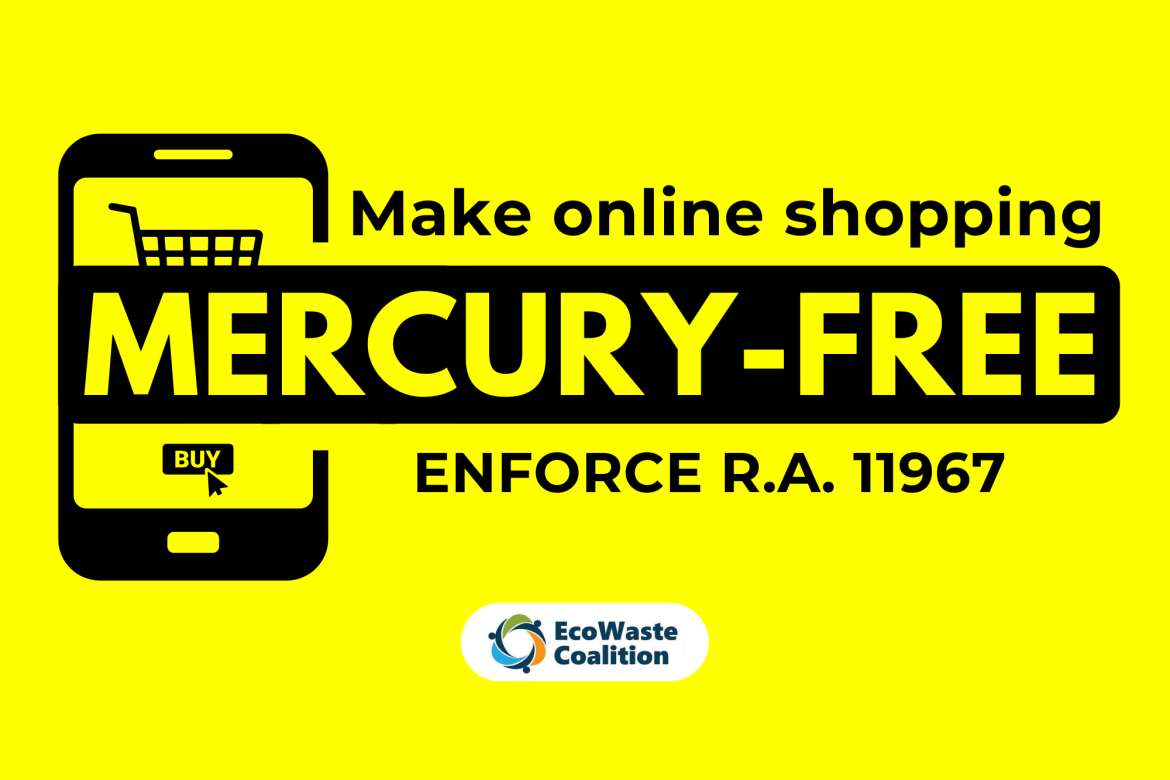QUEZON CITY — The EcoWaste Coalition sounded the alarm against the sale of beauty kits consisting of unauthorized products, including a facial cream for lightening the skin tone with close to 30,000 parts per million (ppm) of mercury, a highly toxic chemical banned in such cosmetics
The group, which has been tracking mercury-added cosmetics since 2011 and promoting regulatory action to halt the unlawful trade, revealed that it has monitored product listings for 3-in-1 and 4-in-1 “made in Pakistan” Goree beauty kits that are being sold online.
As it has reported to the Food and Drug Administration (FDA) last week, the group monitored the online sale of Goree 4-in-1 beauty kit consisting of Goree Beauty Cream with Lycopene, Goree Whitening Soap, Goree Brightening Serum, and Goree Vitamin E – Niacinamide Capsule, as well as Goree 3-in-1 beauty kit comprising of Goree Gold 24K Beauty Cream, Goree Gold Beauty Soap and Goree Gold Serum.
None of the above Goree products has a valid certificate of product notification. In fact, the FDA has already issued multiple public health advisories warning the public against the purchase and use of unauthorized and mercury-containing Goree products.
To demonstrate how toxic Goree products are, the group bought a Goree Beauty Cream with Lycopene and a Goree Whitening Soap from an online seller and had them screened for mercury using a handheld X-Ray Fluorescence (XRF) analyzer.
While mercury was not detected on the analyzed Goree Whitening Soap (flagged by the FDA in 2018), mercury measured at 29,850 ppm was detected on the Goree Beauty Cream with Lycopene (flagged by the FDA in 2017 and again in 2023).
Aside from FDA-Philippines, health product regulators in countries like Brunei, China (Hong Kong), New Zealand, Singapore, Sweden and the USA have flagged Goree beauty products for being contaminated with mercury.
Swedish authorities in April 2025, for example, rejected the importation at the border of Goree Beauty Cream with Lycopene for containing mercury, noting “mercury accumulates in the body and can damage the kidneys, brain and nervous systems (and) may affect reproduction and the unborn child.”
As mercury-added products such as Goree continue to proliferate online, the EcoWaste Coalition renewed its call on the management of digital and social media sites to ban the use of their platforms to peddle dangerous articles adulterated with mercury in line with the Internet Transactions Act, which aims to “guarantee effective regulation of e-commerce to protect consumer rights.”
Last July 12 to 31, the group combed Lazada, Shopee, Facebook, Instagram and TikTok and identified 1,146 product listings for mercury and mercury-added products, including 1,057 for FDA-flagged skin lightening products with mercury content; 53 for mercury-based medical devices such as sphygmomanometers, thermometers and dental amalgam; 34 for liquid mercury for mining use; and 2 for mercury to counter spells and sorcery.
According to health experts, chronic exposure to mercury in skin lightening products can cause damage to the nervous system, the kidneys and the skin itself. Symptoms may include rashes, impaired hearing and vision, depression, insomnia, irritability, inattentiveness, memory loss, change in the taste function, numbness, tingling and tremors. In severe cases, renal failure may occur.
To prevent mercury exposure, the EcoWaste Coalition urged consumers to embrace their natural skin color and avoid skin bleaching, lightening or whitening products, especially those flagged by the FDA for lacking market authorization and/or for containing mercury and other hazardous substances.
It also advised consumers not to buy health products with unidentified composition or from doubtful sources; exercise caution when buying such products online; be suspicious of exaggerated, “miraculous” and “no side effects” claims; and to see a doctor if feeling unwell after use.
Additionally, the EcoWaste Coalition encouraged consumers to visit the FDA verification portal at https://verification.fda.gov.ph/Home.php before making a purchase to check if the establishment has a license to operate or if the product is duly notified or registered with the FDA.



